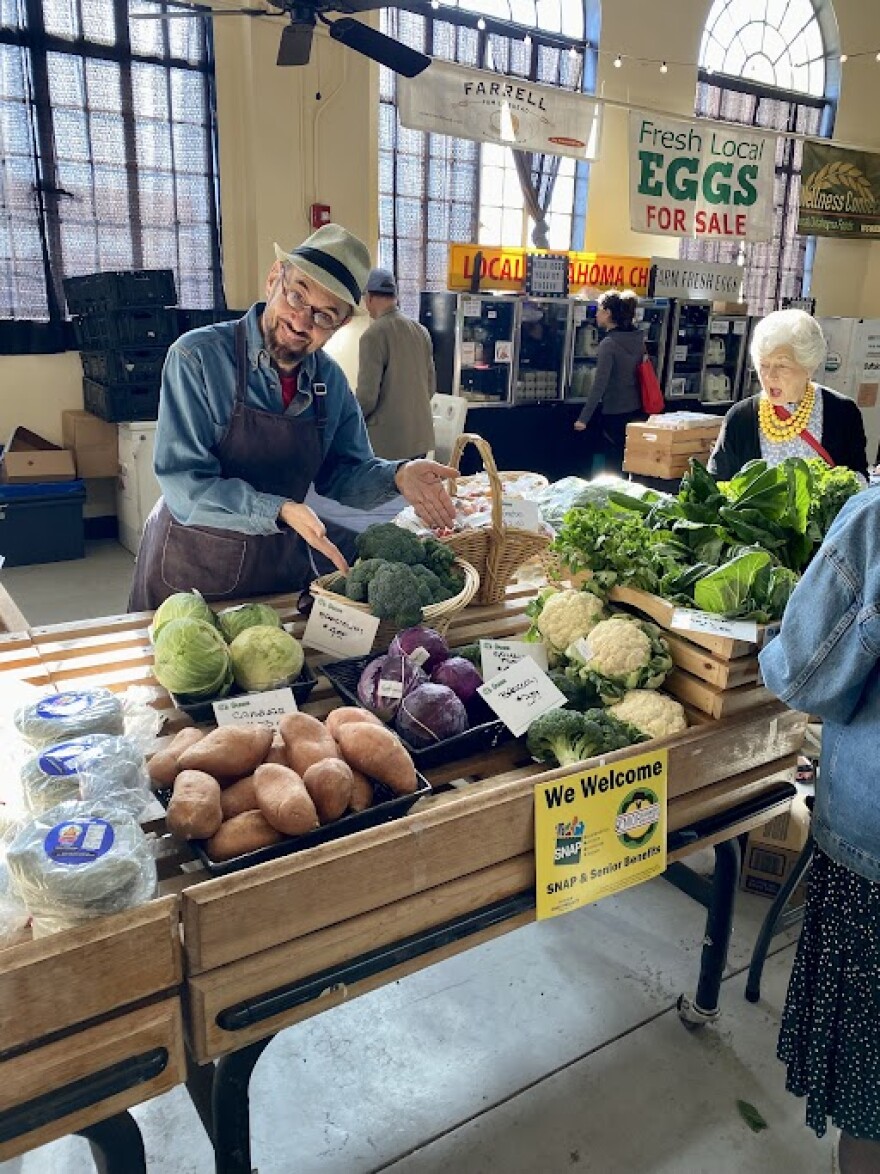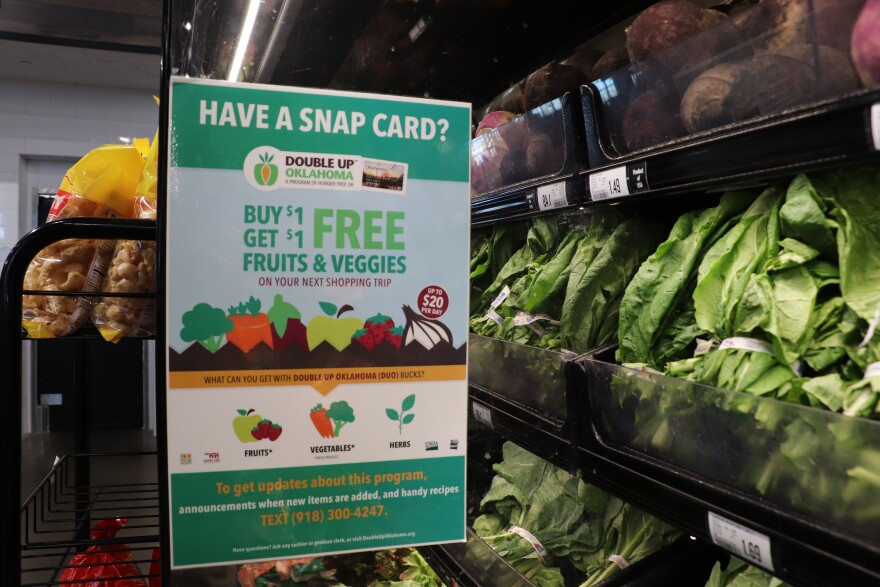While Oklahoma is looking to restrict candy and soft drinks from the Supplemental Nutrition Assistance Program, or SNAP, the federal government is making changes of its own through President Donald Trump's Big Beautiful Bill Act. The state's waiver has not been approved yet, but federal changes would impact its rollout.
SNAP is the nation's largest food assistance program, and in Oklahoma, almost 700,000 people participate in it, according to the U.S. Department of Agriculture.
In late June, Gov. Kevin Stitt, alongside Health and Human Services Secretary Robert F. Kennedy Jr., announced the state is requesting a waiver from the USDA to ban the purchase of carbonated soft drinks and candy using SNAP benefits. It's part of the Make Oklahoma Healthy Again Campaign and would take effect next year if approved.
Another change is coming for SNAP as well: the GOP's recent Big Beautiful Bill Act. The act will soon force states to pay millions of dollars more for SNAP and tweak existing programs. In Oklahoma, food advocates estimate it will cost about $300 million annually.
In a statement, Carrie Snodgrass, a spokesperson for the Oklahoma Department of Human Services, said officials are still working to assess the federal law's impact on services.
"As implementation moves forward, we remain committed to working hand-in-hand with these partners and our communities to ensure all Oklahomans are informed throughout the transition," Snodgrass said in a statement. "Further information will be provided in the coming weeks as more details become available."
What does "candy" and "soft drinks" mean?
Under the direction of Stitt, the Oklahoma Department of Human Services requested to exclude the purchase of "carbonated soft drinks and candy" through SNAP, according to his executive order.
Six junk food restriction waivers from states have been approved since the Trump Administration took office. Previously, the USDA had denied such requests. Certain lawmakers have said SNAP restrictions would make the program more nutritious and prevent taxpayer money from being spent on unhealthy foods.
"If you want to drink a bottled soda, you should be able to have that right. We live in a country where we have individual freedom," Kennedy said at a press conference in June. "The federal government should not be paying for it through taxpayer money."
But experts and anti-hunger advocates argue it's more complicated.
Chris Bernard, president and CEO of Hunger Free Oklahoma, said SNAP waivers do not work because they have not been proven to be effective. He said the waiver's definitions for soft drinks and candy are confusing.
"Like no matter what you do in these categories, you either over-include or under-include," Bernard said. "So I think, to me, when I read it, it defines a certain category of things. But there are lots of unhealthy things people will still be able to buy."
If the request is approved, it would not only include carbonated soft drinks but also bottled or canned sweet tea and flavored waters with sweeteners.
In the waiver, soft drinks include nonalcoholic beverages containing sweeteners, including soda, energy drinks, sports drinks and flavored water. But it does not include drinks with milk, milk substitutes, other dairy alternatives or more than 50% of fruit or vegetable juice.
Meanwhile, "candy" includes chocolate bars, hard candies, chewing gum and mints.
Candy is defined in the waiver as solids, semi-solids or molded preparations of sugar, sweeteners or chocolate with or without ingredients like fruit and nuts that are "commonly marketed" as candy, chocolate bar, chewing gum or similar confectionery.
It does not include baked goods such as cookies, bread or pastries.
The waiver mentions using an education program that had its funding cut

In another section of the request, state officials note they will continue to use the SNAP-Ed Program to promote healthy eating and nutritious food choices.
But SNAP-Ed, the nation's largest nutrition education program, had its funding cut in the Big Beautiful Bill Act. The program will run out of funding at the end of September.
In the state, four agencies are implementing the program. One of them, the Oklahoma Nutrition Information & Education (ONIE) Project, is through the University of Oklahoma's Hudson College of Public Health.
Meredith Scott, University of Oklahoma professor and director of the ONIE Project, said most of the project's initiatives are funded through SNAP. She said adding new food restrictions to the program without education would leave families overwhelmed and confused.
"Historically, SNAP Education would be the main source of information on something like this," Scott said. "And I think there's going to be a hole in services for that."
She said the change will likely mean roughly 100 Oklahomans' jobs will be impacted. It will also affect thousands of community partners like food banks, tribal organizations, farmers markets and nonprofits.
The 22-year-old organization promotes healthy living. Scott said an example of this is ONIE's local food access initiative, which focuses on increasing purchasing among SNAP participants at farmers' markets.
In the past five years, she said the number of farm stands at markets accepting SNAP dollars has doubled, and there's been a 54% increase in benefits used at stands.
"I've personally been working for SNAP Education for 16 years and am extremely invested in this," Scott said. "I was raised around SNAP Education and my grandmother was a nutrition educator and so, I really saw the impact and how it was helpful."
SNAP will soon cost states millions of dollars, food advocates worry about administrative resources
Currently, the federal government pays for SNAP benefits and splits the program's administrative costs in half with states.
The Big Beautiful Bill Act requires states to pay 75% of administrative costs starting next fall. Beginning in fall 2027, states may be required to pay a portion of benefit costs if their program's reported error rate in fiscal year 2025 or 2026 exceeds a certain threshold. The benefit cost will then be based on the error rate of the prior three years.
Error rates are over or underpayments made to recipients, not fraud, according to the USDA.

In a video, Republican Sen. James Lankford stated that some states do a better job of enforcing the program's rules than others. He said the bill adds an incentive for states.
"We're giving about two or three years for them to be able to prepare for that, to give time for the states, like ours, to say 'What can we do better to be able to enforce the federal rules,'" Lankford said. "But we're not slashing food stamps, we're just saying you've gotta be more efficient in how you carry this out."
Food advocates say the measure could mean fewer people receiving the benefit.
Based on Oklahoma's current program error rate, Hunger Free Oklahoma estimates the state would have to pay $270 million in benefit cost and an additional $30 million for administration.
Bernard of Hunger Free Oklahoma said the priority should be solely lowering the state's error rate, rather than focusing on a SNAP waiver.
"That should be what we – every bit of the administration's focus should be on," he said. "And then we should invest in things that we know work like nutrition incentives rather than restricting a small category of unhealthy things and acting like that's going to solve anything. While we also cut every nutrition education program associated with SNAP."
This report was produced by the Oklahoma Public Media Exchange, a collaboration of public media organizations. Help support collaborative journalism by donating at the link at the top of this webpage.






